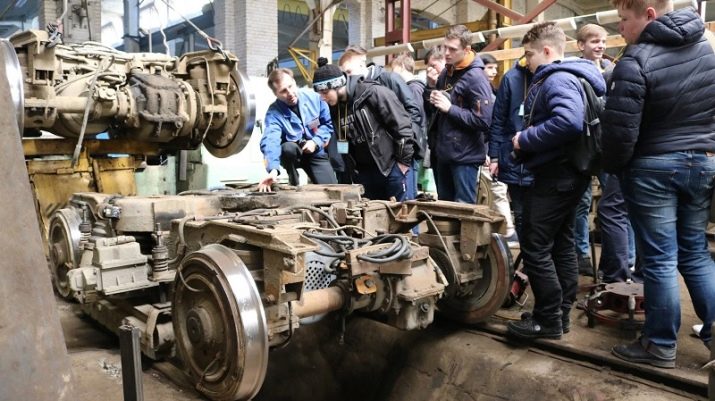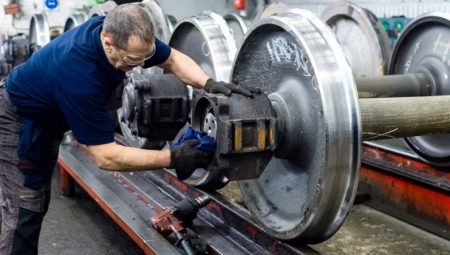If you are attracted to working professions, then you should pay attention to the position rolling stock repairman. This specialty will attract young people who are fond of technical disciplines.
Pros and cons of the profession
Work on the railway is associated with a high level of responsibility. Accordingly, those people who are involved in this type of activity should possess the appropriate level of educational preparation, a large amount of theoretical knowledge, as well as practical skills. The most important figure on the railroad is the mechanic for the repair of rolling stock, as he is engaged in the maintenance of various vehicles necessary for the transport of goods and passengers. During the performance of his work tasks, the employee determines the presence of defects and malfunctions, and also carries out preventive work and adjustment.
The advantages of the profession include:
- relevance and relevance;
- high earnings.
The disadvantages:
- great responsibility;
- difficult working conditions.
Before you decide to receive a similar profession, it is very important to study all the pros and cons so that you do not regret your choice in the future.
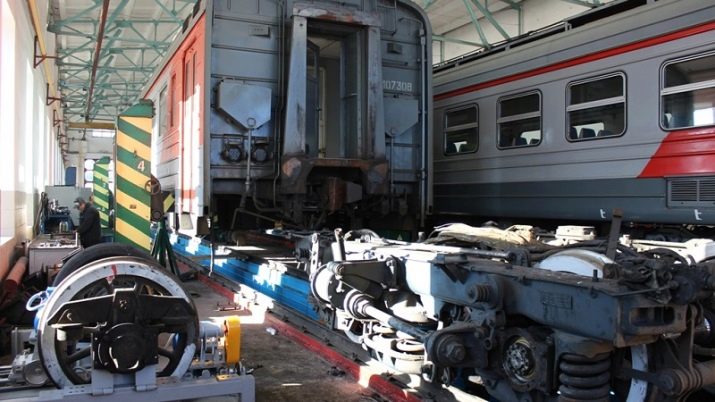
Employee Requirements
Rolling stock repair fitter is a person who does a very important job. That is why increased requirements are being put forward by repairmen on the part of employers.
Personal qualities
In the work of the mechanic of the rolling stock, an important role is played not only by professional skills, but also the personal characteristics of the specialist. In order for a person to be able to carry out his work tasks efficiently, he must have:
- good physical fitness;
- endurance;
- good vision;
- developed memory;
- analytic mind;
- propensity for logical thinking;
- developed imagination;
- attention to detail, etc.
When describing a vacancy, employers often indicate quality data.
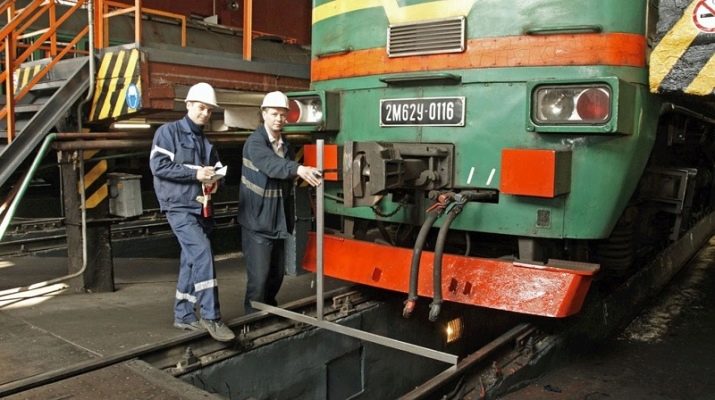
Education and experience
First of all, it should be said that the position of a mechanic for the repair of rolling stock cannot be obtained without availability of a diploma of relevant education. In addition, an important role is played by experience (in the process of employment, employers will give preference to those candidates who previously worked in their specialty). However, not only formal features matter. The employer can also check the availability of professional knowledge and skills, namely:
- knowledge of the technical features of the devices;
- ability to carry out repair and adjustment work;
- knowledge of existing methods for checking equipment, as well as the ability to apply these methods in practice;
- safety precautions, etc.
Responsibilities for different ranks
The fitter carries out his professional activities in accordance with official documents. These include job descriptions, professional standards, a unified tariff and qualification directory of work and professions of workers (or ETKS), internal documentation of the enterprise, etc. It is important to note: even despite the fact that the above documents are standardized, Each employer can change and supplement them depending on their needs.
In general, the duties of a specialist in servicing wagons and locomotives depend on his discharge.
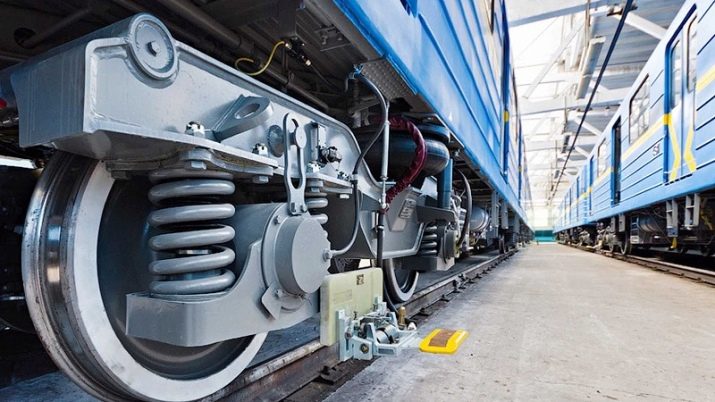
First
Specialists who have the first rank perform fairly simple functions:
- run of the thread on the fixing elements;
- cleaning of various components;
- cutting and filing of elements;
- lubrication of components;
- sharpening specialized professional tools, etc.
Accordingly, in order to perform all these tasks, the specialist must know the basics of locksmithing.
Second
Such a locksmith is a more qualified employee, therefore, is able to perform more complex tasks:
- work with elements according to 12-14 qualifications;
- creating simple parts;
- the implementation of the assembly and disassembly of simple nodes;
- drilling holes using special equipment;
- slipping of shafts of cranked diesel locomotives, etc.
The required knowledge and skills of such a professional should include work skills and theoretical knowledge of various locksmith tools and fixtures.
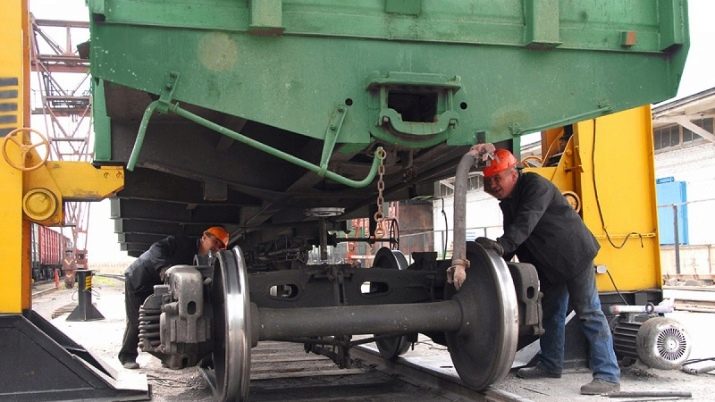
Third
If the employee has the third category, then he is entrusted with the performance of such tasks:
- work with details on 11-12 qualifications;
- removal and installation of beams, wagon trolleys, current collector hoses;
- checking the correct operation of pneumatic equipment;
- adjustment of devices and mechanisms;
- Inspection and refueling of axleboxes on sliding bearings, etc.
In order for a locksmith to be able to carry out his work tasks efficiently, he must be familiar with the rules for adjusting and testing specialized devices and mechanisms.
Fourth
The employees who received the fourth rank are engaged in:
- repair shock absorbers, fans and heaters;
- disassembling the wheel-motor blocks;
- checking operation of axleboxes on rolling bearings;
- installation of o-rings for pistons, etc.
Locksmith must possess knowledge in the field of design purposes, as well as methods and methods for disassembling and assembling the main parts of repaired objects rolling stock.
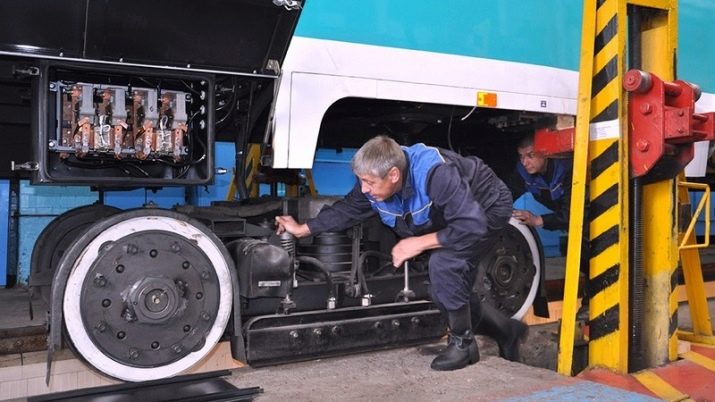
Fifth
The holder of the fifth category in the course of performing his work tasks is engaged in:
- alignment of additional elements of diesel locomotives;
- inspection of diesel blocks and crankcases;
- installation of antivibrators;
- checking the correct functioning of traction gears;
- fitting bushings, etc.
At the same time, it is important that a professional possess specialized knowledge in the field of design features and functional purpose of various units and mechanisms.
Sixth
A locksmith who has upgraded his qualifications to the sixth category must be able to:
- carry out repair and adjustment of automatic couplers;
- center the diesel unit;
- grind spools;
- establish parallels of steam engines;
- repair vertical gears, etc.
The fitter of the sixth category should have theoretical knowledge regarding methods for checking the assembly of a complex of nodes and assembly groups of a particular object to be repaired.
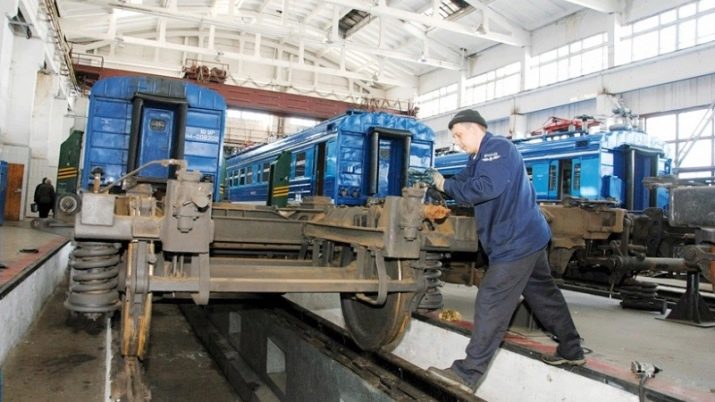
Seventh
The duties of a specialist in the seventh category include:
- diagnostic, preventive and verification work;
- turbocharger rotor balancing;
- adjustment of control automation;
- adjustment of main bearings;
- checking the correct operation of hydraulic systems, etc.
In order to accurately perform the listed (as well as additional) work tasks, a specialist must know and understand in detail the features of the device equipment.
Eighth
This category is considered the highest, respectively, that the specialist who possesses it can perform the most complex and complex tasks, namely:
- repair complex components and structural parts;
- set up electronic equipment;
- troubleshoot the use of rolling stock;
- run in wheel-motor blocks;
- test live subway cars, etc.
The mandatory requirements for an employee of the eighth category include theoretical knowledge regarding the device, as well as the series of vehicles used.
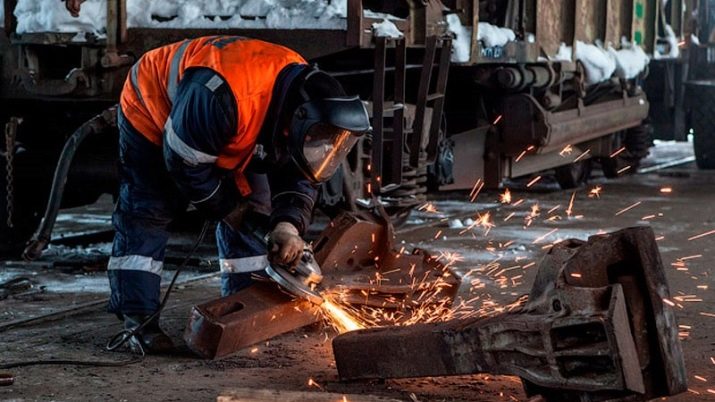
Prestige and job prospects
Prestigious locksmith position, since highly qualified specialists can receive quite a large salary, the size of which depends on the region of residence, level of education, experience and specific place of work.
Most often, these specialists work in railway depots. At the same time, with an increase in the rank, they can expect to receive higher posts (for example, the head of the department, the labor safety officer or even the head of the enterprise).
Where to study?
Specialty training takes place in secondary vocational schools, where you can go after the end of the 9th grade. At the same time, it is recommended to give preference to specialized railway technical schools and colleges. In advance, it is worth bearing in mind the fact that the learning process itself is quite complicated, since it involves obtaining a large amount of theoretical knowledge and practical skills of a technical nature. The average duration of study is 3 years.
However, after receiving basic education, a mechanic for the repair of rolling stock must constantly replenish his knowledge and improve his qualifications. Only in this case will he remain a sought-after and relevant specialist in the labor market.
